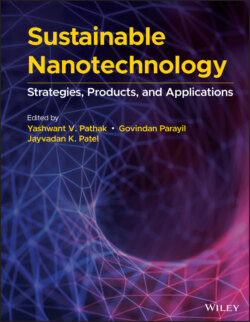Читать книгу Sustainable Nanotechnology - Группа авторов - Страница 63
2.3.3 Food Science Technology
ОглавлениеRecent advances in nanotechnology have made diverse applications in food technology possible, which include food safety, food additives, nanodelivery systems, biosecurity, and nanotoxicity. Health benefit and quality of food is a major concern for consumers, without reducing nutrition benefits. Due to the availability of many required elements with less‐toxic effect of NMs, the demand of NMs is continuously growing in food science [52]. In nanoencapsulation of various components such as vitamins, lycopene, and lutein, many naturally occurring colors can be used as a tool for the delivery of various additives. By nanoencapsulation, spoilage and microbial contamination can be prevented in the food product. It also improves shelf life while improving safety of the food product [53]. Bratovčić et al. have emphasized on the improvement of sustainability of agrifood using nanotechnology by controlling microorganisms for decreasing the wastage of food and increasing the safety of food [54].
Fernandez et al. have worked with carotene protection using nanofibers of zein by encapsulation to increase its stability to oxidation with the help of nontoxic solvents such as dimethyl formamide and chloroform, which makes it sustainable [55]. In nanoencapsulation, there is a direct contact of NMs with food during consumption, e.g. silicon dioxide (SiO2) is mostly used as a carrier for fragrance of food products [56]. Many lipid‐based formulations that are nanoencapsulated were developed to increase the effectiveness of antioxidants with its bioavailability and solubility [57]. One study showed that nanosized edible coating is a versatile solution for extension of shelf life of food and minimization of spoilage [58].
